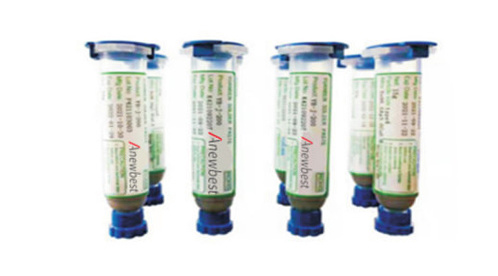08
2024
-
06
How to Choose the Best Solder Paste for Your Electrical Projects
Author:
--- # Factors to Consider When Choosing Solder Paste When embarking on an electrical project, one of the key components you'll need is solder paste. Solder paste is a crucial material used in joining electronic components together. However, with a wide range of options available on the market, it can be challenging to determine which solder paste is the best fit for your project. Here are some ess
---
# Factors to Consider When Choosing Solder Paste
When embarking on an electrical project, one of the key components you'll need is solder paste. Solder paste is a crucial material used in joining electronic components together. However, with a wide range of options available on the market, it can be challenging to determine which solder paste is the best fit for your project. Here are some essential factors to consider when selecting the right solder paste for your electrical projects.
## 1. Alloy Composition
The alloy composition of solder paste plays a significant role in determining its performance. Common alloy compositions include lead-free and lead-based solder pastes. Lead-free solder pastes are environmentally friendly and comply with RoHS regulations. On the other hand, lead-based solder pastes are known for their high reliability and low cost. Consider the specific requirements of your project when choosing between lead-free and lead-based solder pastes.
## 2. Particle Size
The particle size of solder paste particles affects the printing and reflow processes. Fine particle sizes are suitable for small component sizes and fine-pitch applications. Coarser particle sizes are better suited for larger components and through-hole soldering. Understanding the particle size requirements of your project will help you select the appropriate solder paste.
## 3. Flux Type
Flux is a critical component of solder paste that aids in the soldering process. Different flux types offer varying degrees of activity, residue, and compatibility with different materials. No-clean flux is commonly used in electronics manufacturing as it leaves little to no residue after soldering. Water-soluble flux is another option that is easier to clean but may leave behind residue that requires thorough washing. Consider the flux type that best suits your project's requirements.
## 4. Shelf Life
Solder paste has a limited shelf life due to its flux content, which can degrade over time. It's essential to consider the shelf life of the solder paste and ensure that you can use it before it expires. Proper storage conditions, such as refrigeration, can help extend the shelf life of solder paste.
## 5. Application Method
The method of applying solder paste to your circuit board can influence the type of solder paste you choose. Common application methods include stencil printing, dispensing, and syringe dispensing. Ensure that the solder paste you select is compatible with your chosen application method for optimal performance.
## 6. Manufacturer Reputation
When choosing solder paste for your electrical projects, consider the reputation of the manufacturer. Established manufacturers with a track record of producing high-quality solder paste are more likely to deliver reliable and consistent results. Researching and selecting a reputable manufacturer can help ensure the success of your project.
---
# FAQs About Solder Paste
## 1. Can I use lead-free solder paste for all my projects?
Lead-free solder paste is suitable for most projects, especially those that require compliance with environmental regulations. However, for projects that prioritize reliability and cost-effectiveness, lead-based solder paste may be a better choice.
## 2. How do I store solder paste to maximize its shelf life?
Solder paste should be stored in a cool, dry place away from direct sunlight and moisture. Refrigeration can help extend the shelf life of solder paste, but be sure to allow the paste to reach room temperature before use.
## 3. Can I mix different types of solder paste?
It is not recommended to mix different types of solder paste as it can affect the performance and reliability of the solder joints. Stick to using one type of solder paste for each project for consistent results.
## 4. How do I know if the solder paste is compatible with my components?
Check the datasheet provided by the solder paste manufacturer to ensure compatibility with your components. Conducting compatibility tests on a small scale before full-scale production can help avoid potential issues.
## 5. How often should I replace solder paste?
Solder paste should be replaced periodically, even if it has not reached its expiration date. Regularly inspect the solder paste for signs of contamination, separation, or degradation and replace it as needed to maintain optimal soldering quality.
---
# Conclusion
Choosing the best solder paste for your electrical projects is a crucial decision that can impact the quality and reliability of your final product. By considering factors such as alloy composition, particle size, flux type, shelf life, application method, and manufacturer reputation, you can make an informed choice that meets the specific requirements of your project. Remember to conduct thorough research, consult with experts, and test the solder paste before full-scale production to ensure successful soldering results.
# Factors to Consider When Choosing Solder Paste
When embarking on an electrical project, one of the key components you'll need is solder paste. Solder paste is a crucial material used in joining electronic components together. However, with a wide range of options available on the market, it can be challenging to determine which solder paste is the best fit for your project. Here are some essential factors to consider when selecting the right solder paste for your electrical projects.
## 1. Alloy Composition
The alloy composition of solder paste plays a significant role in determining its performance. Common alloy compositions include lead-free and lead-based solder pastes. Lead-free solder pastes are environmentally friendly and comply with RoHS regulations. On the other hand, lead-based solder pastes are known for their high reliability and low cost. Consider the specific requirements of your project when choosing between lead-free and lead-based solder pastes.
## 2. Particle Size
The particle size of solder paste particles affects the printing and reflow processes. Fine particle sizes are suitable for small component sizes and fine-pitch applications. Coarser particle sizes are better suited for larger components and through-hole soldering. Understanding the particle size requirements of your project will help you select the appropriate solder paste.
## 3. Flux Type
Flux is a critical component of solder paste that aids in the soldering process. Different flux types offer varying degrees of activity, residue, and compatibility with different materials. No-clean flux is commonly used in electronics manufacturing as it leaves little to no residue after soldering. Water-soluble flux is another option that is easier to clean but may leave behind residue that requires thorough washing. Consider the flux type that best suits your project's requirements.
## 4. Shelf Life
Solder paste has a limited shelf life due to its flux content, which can degrade over time. It's essential to consider the shelf life of the solder paste and ensure that you can use it before it expires. Proper storage conditions, such as refrigeration, can help extend the shelf life of solder paste.
## 5. Application Method
The method of applying solder paste to your circuit board can influence the type of solder paste you choose. Common application methods include stencil printing, dispensing, and syringe dispensing. Ensure that the solder paste you select is compatible with your chosen application method for optimal performance.
## 6. Manufacturer Reputation
When choosing solder paste for your electrical projects, consider the reputation of the manufacturer. Established manufacturers with a track record of producing high-quality solder paste are more likely to deliver reliable and consistent results. Researching and selecting a reputable manufacturer can help ensure the success of your project.
---
# FAQs About Solder Paste
## 1. Can I use lead-free solder paste for all my projects?
Lead-free solder paste is suitable for most projects, especially those that require compliance with environmental regulations. However, for projects that prioritize reliability and cost-effectiveness, lead-based solder paste may be a better choice.
## 2. How do I store solder paste to maximize its shelf life?
Solder paste should be stored in a cool, dry place away from direct sunlight and moisture. Refrigeration can help extend the shelf life of solder paste, but be sure to allow the paste to reach room temperature before use.
## 3. Can I mix different types of solder paste?
It is not recommended to mix different types of solder paste as it can affect the performance and reliability of the solder joints. Stick to using one type of solder paste for each project for consistent results.
## 4. How do I know if the solder paste is compatible with my components?
Check the datasheet provided by the solder paste manufacturer to ensure compatibility with your components. Conducting compatibility tests on a small scale before full-scale production can help avoid potential issues.
## 5. How often should I replace solder paste?
Solder paste should be replaced periodically, even if it has not reached its expiration date. Regularly inspect the solder paste for signs of contamination, separation, or degradation and replace it as needed to maintain optimal soldering quality.
---
# Conclusion
Choosing the best solder paste for your electrical projects is a crucial decision that can impact the quality and reliability of your final product. By considering factors such as alloy composition, particle size, flux type, shelf life, application method, and manufacturer reputation, you can make an informed choice that meets the specific requirements of your project. Remember to conduct thorough research, consult with experts, and test the solder paste before full-scale production to ensure successful soldering results.
solder paste
undefined









